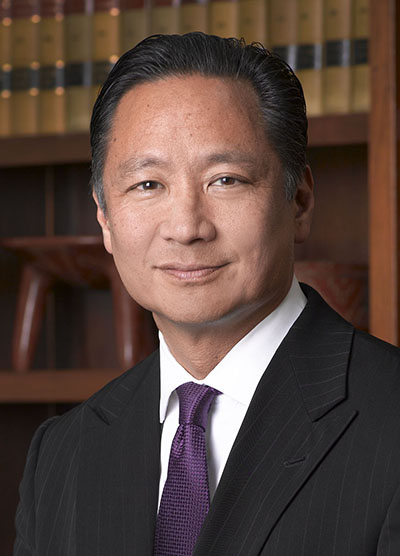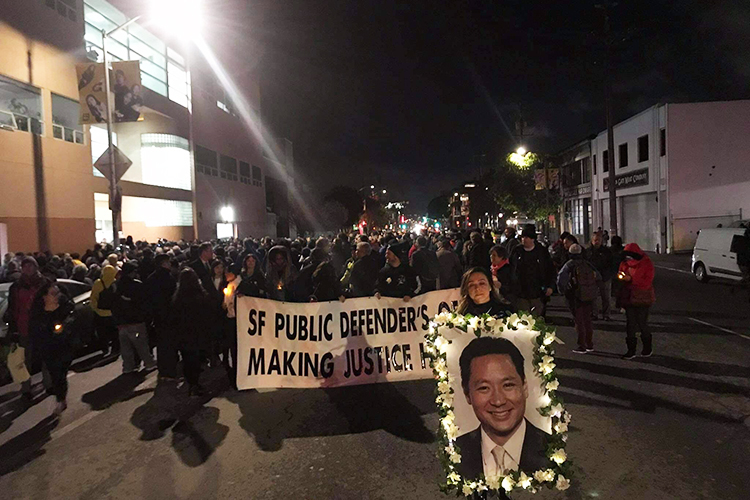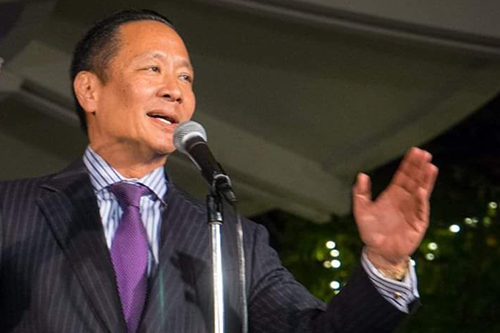Remembered: Jeff Adachi, alumnus and San Francisco public defender
The public defender's quest for social justice had campus roots
February 28, 2019
Jeff Adachi, the San Francisco public defender and UC Berkeley alumnus who died suddenly last Friday at age 59, is being remembered this week by the campus community-at-large for embodying Berkeley’s values and mission through his work as a tireless advocate for social justice and as an award-winning filmmaker.
Adachi suffered a medical emergency on Feb. 22 and was pronounced dead at California Pacific Medical Center’s Pacific Campus. Police are investigating his death, but reports say they do not believe there was foul play.
His colleagues, friends and city leaders held a candlelight vigil for him last night outside the San Francisco Public Defender’s office at 555 Seventh Street. The event was co-sponsored by a large, diverse array of organizations, and a march to City Hall followed.

Jeff Adachi, San Francisco public defender and UC Berkeley alumnus. (Photo courtesy of San Francisco Public Defender’s Office)
Catherine Ceniza Choy, professor and chair of Berkeley’s Department of Ethnic Studies, said Adachi “embodied the best of what we try to do here — excel in your arena, but do it in a way that is good for the public, for the common good.”
At Berkeley, Adachi, a third-generation Japanese-American, majored in Asian American studies in the Department of Ethnic Studies. After receiving his B.A. on Dec. 12, 1981, he went on to earn his law degree in 1985 from Hastings College of the Law.
Last month, Adachi was sworn in for a fifth term as the only elected public defender in California. According to the public defender’s website, Adachi ran an office of more than 100 attorneys and 80 support staff — 40 percent of his staff were people of color, 20 percent were LGBTQ and 50 percent were women — that annually provided legal representation to more than 25,000 indigent people charged with crimes.
His office was recently awarded the Champions Public Defense Award from the National Association of Criminal Defense Lawyers for its work on bail reform. Among Adachi’s other innovative programs is an immigration unit launched in 2017 to represent undocumented immigrants locked in detention facilities and facing deportation.
A deep sense of justice
The incarceration of his grandparents during World War II, because of their Japanese ancestry, gave Adachi “his deep sense of justice. Particularly defending those accused wrongly fueled his passion, and it’s not at all surprising that at Cal he found an environment that helped to encourage and center his foundational beliefs in social justice and engagement,” said Berkeley alumnus Stephen Gong, executive director of the nonprofit, San Francisco-based Center for Asian American Media.
“That marks almost all Cal grads, especially from those years,” he added, referring to the years of turbulent student protests that led to the founding in 1969 of the Department of Ethnic Studies and that accompanied the civil rights movement and the Vietnam War.
Ling-chi Wang, emeritus professor of ethnic studies, said his former pupil “was an activist student, including being a critic of Asian American studies, during the years he was here at Berkeley as an undergraduate. And even though he was always busy, he never hesitated to support causes I brought to his attention.”
“A warrior for social justice and criminal reform” is how Aarti Kohli will remember Adachi. Kohli, a 1993 graduate of Berkeley, is executive director of the San Francisco-based, nonprofit Asian Americans Advancing Justice-Asian Law Caucus. Adachi was on the leadership team for her group, the nation’s first legal and civil rights organization for low-income Asian Pacific Americans.
“We worked with Jeff on the intersection of criminal justice and immigration, and also on sanctuary policies, for our Cambodian and Southeast Asian clients with criminal records,” she said. “Jeff was an ally in advocating for police accountability.”
She said Adachi started a project in which public defenders go to immigration court to help immigrants who face deportation, including Cambodian- and Vietnamese-Americans who came to the United States as youngsters. There aren’t enough lawyers in the nonprofit sector who can help, she added, and most clients are low-income and can’t pay private attorneys.
“He stepped up and said his office would help, and we supported that idea,” said Kohli. “It’s great to have a government office supporting immigrants’ rights.”

A Feb. 27 candelight vigil and march in San Francisco honored San Francisco Public Defender Jeff Adachi’s legacy. (Photo by Nigel Phillips)
Although Kohli and Adachi attended Berkeley at different times, she said she developed on campus “my own political analysis to help me understand the fight for social justice, and I feel it was the same for Jeff, particularly in the Asian American studies program. There are so few places where you can get that level of insight into the Asian-American story, and how it fits into the fight for civil rights.”
“It was at Berkeley that I learned about the Chinese Exclusion Act, about Japanese internment. Things you’re never taught in high school,” she added. “Jeff learned from his family story, but Berkeley helps you connect your personal family story to a broader political and social context, and you make the changes you need to become a leader, to shape society, and it becomes your passion for your career. That’s what Jeff was trying to do in his role as public defender. He wanted to help create and reform the criminal justice system.”
A filmmaker focused on injustice
Gong says Adachi was additionally talented in making films, “and that was surprising, for a public official.” Adachi made three feature-length documentaries and two short films. The feature films were “The Slanted Screen” (2006), “You Don’t Know Jack: The Jack Soo Story” (2009) and “The Defender.” All examined racial inequities; the first two particularly focused on discrimination faced by Asian-American actors. Gong added that Adachi also started an Asian-American artists’ foundation and instituted an awards program for Asian-American media artists.
Adachi’s death is “a terrible loss,” he said.
Gong’s Center for Asian American Media commissioned Adachi to do a short, one-hour documentary, which was called “The Ride,” about Adachi’s work defending an African-American man charged with assault on an officer.

San Francisco Public Defender Jeff Adachi at a December 2016 Japantown rally against the Muslim ban. (Photo by Bob Hsiang)
“Jeff consciously knew that this whole work of a public defender’s office deserved and needed to be supported,” Gong said. “He was active in a national network of public defenders and believed their calling was so important. He was non-stop in his passion for life and used every minute of the day to do good, to help.”
At Berkeley, Choy commended Adachi’s short, eight-minute film about race in America called “Racial Facial” — a blur of images and video that depicts discrimination against African-Americans, Native Americans, Asian-Americans, Mexican-Americans and Latin Americans throughout history. And she said she shows “Slanted Screen” to her students, because it’s “entertaining and eye-opening and about how injustice can take place in popular culture and is seen through the lens of Asian-American men and their misrepresentation or lack of representation in film and TV. It’s so moving for the students and me.”
Gong says his center is planning a tribute to Adachi in May at CAAMFest, previously called the San Francisco International Asian American Film Festival. It’s considered the nation’s largest showcase for new Asian-American and Asian films.
Tireless service to Berkeley
Adachi also never stopped pitching in to support his alma mater. Among his many contributions was his service, in recent years, on the advisory board at Berkeley for the Asian American and Asian Diasporas Studies program’s 50th anniversary fundraising campaign.
“At our 2017 reception, he gave an inspiring keynote to a room packed with students, faculty, staff, administrators, alumni and community supporters,” said Lok Siu, Berkeley associate professor of ethnic studies and program coordinator for Asian American and Asian Diaspora Studies. “He spoke forcefully about the importance of sustaining our collective struggle for social justice” and showed his documentary “Racial Facial.”
Choy said she met him briefly at a fundraising event to support Berkeley’s Asian American and Asian Diaspora Studies program.
“Even though I didn’t get to know him as a student,” she said, “I have an admiration for him, and how he always stood up for the most marginalized, disenfranchised people.”
“It’s a tremendous loss for our campus, but his work will live on,” Choy added. “That’s the power of the creative spirit.”